For information about programs, for which more substantial evidence exists, see the excellent article "Black Projects at Groom Lake: Into the 21st Century" by Peter W. Merlin.
F-121 Sentinel
Rumors
This aircraft was built by General Dynamics (Fort Worth), now part of Lockheed Martin, and first flew in 1986. It is a single-seat Mach 3+ reconnaissance aircraft for NRO, and significantly more stealthy than the SR-71A. It is of almost perfect delta planform with 65° leading edge sweep, and its ventral air intake is highly blended into the fuselage. As of 2001, four of these aircraft were operationally based at Groom in hangars 20 through 23.The unofficial F-121 designator was allocated after Lockheed Martin took over the GD Fort Worth assets, and the 121 is said to honor the Lockheed article number of the first A-12 Blackbird aircraft. The F prefix is widely used for bogus designations of secret aircraft, and is not meant to designate the Sentinel as a "Fighter". The code name "Centennial" was also mentioned for this aircraft.
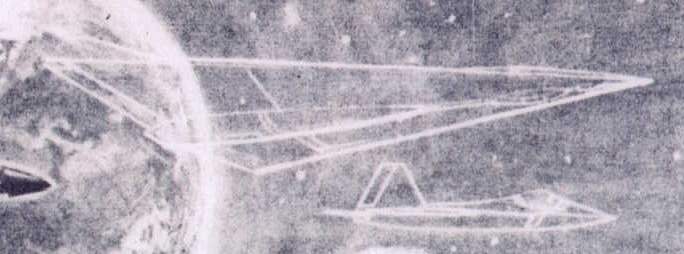 |
| Image: Hughes Electronics |
The above image is part of a Hughes Electronics artwork showing various systems for which Hughes provided electronic and/or reconnaissance equipment. The large outlined delta shape is the F-121. The aircraft has been sighted on several occasions. The most widely publicized events were a sighting by Chris Gibson over the North Sea in 1989, and by Meinrad Eberle (a.k.a. Swiss Montain Bat) et.al. on 8 September 1999 from Tikaboo Peak.
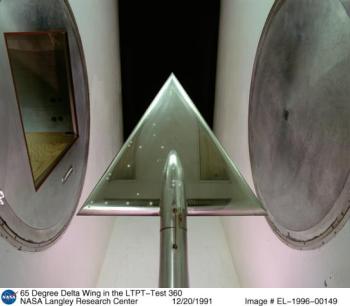 |
| Photo: NASA/Langley via Dreamland Resort |
| NASA wind tunnel model of a 65° delta |
Below are pictures of a model of the F-121, which was built by Byron Salisbury based on sighting reports. The model has a fair number of inaccuracies (e.g., the F-121 has no overwing engine housings and ventral fins), but illustrates the basic design relatively well.
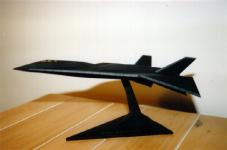 | 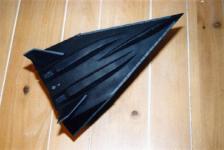 | 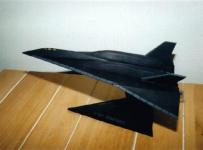 | ||
| Photos: via FAS | ||||
The alleged names and designations also look rather suspicious. The "F-121" label and its background is highly dubious, and the reported names "Centennial" and "Sentinel" sound rather similar - one of them is probably just a garbled variant of the other one.
Although it is quite possible that one (or more) large delta-winged aircraft were/are flying in secret (because of various unconfirmed sightings), any actual names and configurations are still completely unknown (see also Snow Bird). All said, I think it's highly unlikely that the rumored story of the "F-121" comes anywhere near the truth.
A-11 Astra
Rumors
The A-11 Astra is a stealthy replacement for the F-111 Aardvark. It is described as a long highly-swept delta with a serrated trailing edge. Forward-swept rudders are mounted on articulated pylons extending from the trailing edge, and flush ventral air intakes are located near the leading edge. The design is less faceted than the F-117. Characteristics are similar to those quoted for the ATA-B proposal of 1978. The Astra was still in production in 2001, and three aircraft were at Groom at that time for continued developmental testing.Finally, the "A-11" designation (filling the gap between the A-10 Thunderbolt II and the cancelled A-12 Avenger II) and "Astra" name are very dubious. In the past, the USAF has never allocated a standard aircraft designator to a classified aircraft (for obvious reasons), and the "Astra" label has been associated by Black Projects researchers and the "UFO community" to all sorts of claims, including rather outlandish ones.
The "A-11 Astra" rumors are probably a medley of various more or less unfounded claims, which someone has unsuccessfully tried to connect into a coherent story.
Bright Star
Rumors
The Bright Star is a private venture of Lockheed Martin Skunk Works. It is a Mach 2+ supersonic cruise/sonic boom research aircraft, which was used by the Skunk Works to raise DARPA's interest in QSP (Quiet Supersonic Platform) research. Although it is not a DOD project, the USAF provides some support (at least by providing a secret flight test location). The Bright Star has been flying for many years, and was the cause of some of the unexplained sonic booms over the western USA. The Bright Star is the most plausible cause for many so-called "Aurora" sightings.The aircraft was photographed at least twice, at Groom Lake by Andreas von Retyi in 1995 from Tikaboo Peak, and by an unidentified source who made this long distance photograph:
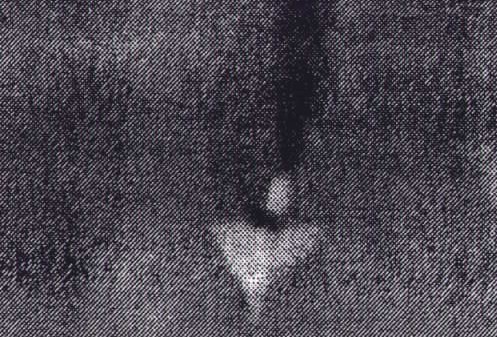 |
| Photo: ??? |
Bright Star is said to be the cause for the famous "Donuts-On-A-Rope" contrails (for photos, see this page), often reported together with a "rumbling" sound. The rumbling is generated by the vehicle in the transoinc speed region, and is essentially a series of low-amplitude sonic booms at a frequency of 1 to 3 Hz. The "donut" contrail is formed by water vapor captured in the shock wave. The "pulsating" sonic boom is directly responsible for both the characteristic sound of the aircraft, and the "strange-looking" contrails.
HGV (Hypersonic Glide Vehicle)
Rumors
The HGV was a recoverable unmanned rocket-powered hypersonic vehicle, contracted in 1979/80 to the UAB (Unmanned Aircraft Bureau) of the Lockheed Skunk Works. It could achieve a speed of Mach 18 and a range of 8000 km (5000 miles) when launched from 20000 m (68000 ft) by a highly modified B-52H. At one time it was planned to develop the HGV into a survivable quick reaction nuclear strike weapon with a payload of two or three nuclear warheads. Some sightings of HGV flight tests were reported during 1989/90. The HGV was about 9 m (30 ft) long, had 75° delta wings, and four vertical tails. It also featured an extendable aero-spike (similar to the Trident SLBM) to reduce hypersonic drag.Snow Bird, BRILLIANT BUZZARD
Rumors
Snow Bird is a very high-speed (Mach 3.5+ cruise) reconnaissance aircraft, which was developed out of the so-called BRILLIANT BUZZARD as a replacement for the SR-71. The name apparently refers to its color (white thermal protection tiles). BRILLIANT BUZZARD (possibly not the real code name) resembled a flying wedge with twin vertical stabilizers. Snow Bird is somewhat similar, but is possibly slightly more rounded externally. It's delta wing planform is roughly similar to that of the Concorde, and it has ventral intakes and inward-canted twin vertical tails. It was flying in late 1999.L301/COPPER COAST
In the mid-1970s, NASA studied hypersonic vehicles as follow-on projects to the X-24B lifting body under the general "X-24C" designation. Lockheed Skunk Works' concept for the X-24C was the L301 design. The L301 was to be rocket and/or scramjet powered, and was designed for speeds of up to Mach 6.65 at 28000 m (92000 ft) altitude. In September 1977, the X-24C/L301 project was officially cancelled for lack of funding, thus ending the documented history of the L301 in the "white world".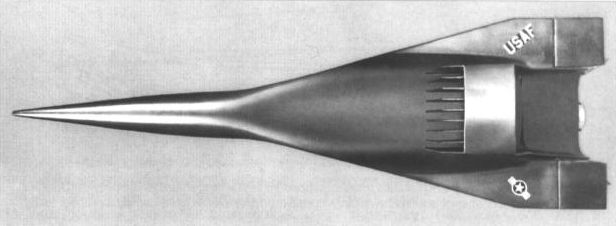 |
| Photo: NASA |
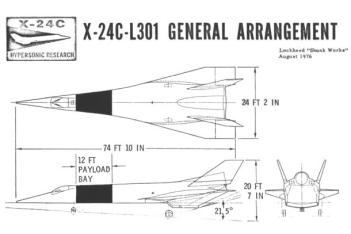 | 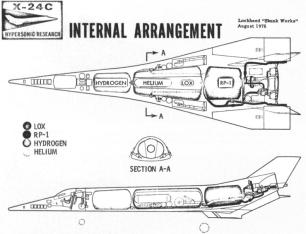 | |
| Drawings: Lockheed | ||
| Lockheed X-24C/L301 design | ||
Rumors
After official cancellation, the DOD took over the L301, and development was continued under the highly classified project COPPER COAST. Lockheed also studied operational derivatives of the L301 as potential successors to the SR-71. These studies included designs for Mach 4 at 60 km (200,000 ft) and Mach 7 at 75 km (250,000 feet). An L301/COPPER COAST test vehicle, slightly different from the published configuration shown in the drawings, was actually built, and it first flew in 1981. The planned operational derivatives of the COPPER COAST vehicle were cancelled, however, because the contract for the SR-71 successor went to General Dynamics with their Sentinel design (see F-121).The L301/COPPER COAST flight test program was run by NASA-Dryden, and in the later flight test phase the NASA referred to the vehicle as SYNCON (Synergetic Configuration). NASA also planned waverider designs as follow-on projects to the L301. The photo below is said to show a wind tunnel model of such a design.
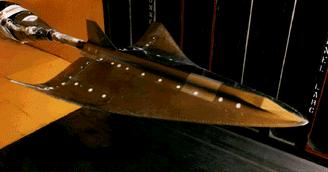 |
| Photo: NASA via FAS |
Andreas Parsch (who maintains a website dedicated to designations for aircraft, guided and unguided weapons, spacecraft, and numerous types of military equipment) wrote the page with the title of this post at the Dreamland Resort website in 2002.
ReplyDeleteRumors mentioned at the page "Secret U.S. Aircraft Projects at Groom Lake" about the alleged "F-121 Sentinel" being a General Dynamics reconnaissance aircraft design with a isosceles triangular platform for the NRO (which only operates satellites) are not only definitely untrue but are also muddled by the fact that the book "Dark Eagles" by the late Curtis Peebles cited an anonymous source as saying that the "F-121 Sentinel" was a Northrop-built equilateral triangular aircraft based on a drawing, while quoting private sources as saying that the "F-121" could take off vertically with an anti-gravity engine. However, engineers have yet to test the concept of antigravity propulsion, so it highly unlikely that Northrop ever built a triangular aircraft powered by an antigravity engine. The codename Centennial mentioned under the entry "F-121 Sentinel" was actually a satellite program and had nothing to do with aircraft technology.
The "HGV (Hypersonic Glide Vehicle)" and "L301/COPPER COAST" entries were listed by Parsch on the webpage "Secret U.S. Aircraft Projects at Groom Lake" in error. For instance, there is no evidence whatsoever that any boost-glide hypersonic weapon design by Lockheed or General Dynamics was ever tested at Groom Lake, although the General Dynamics and Lockheed HGV projects were real. Additionally, Copper Coast refers to a tactical USAF evaluation program and is unrelated to hypersonics, and the unfounded statement in the preface of first edition of "Lockheed Aircraft Since 1913" by Rene Francillon about Lockheed testing a manned hypersonic aircraft was omitted from the second edition of Francillon's book (published in 1987).
Lockheed's work on a reconnaissance aircraft design capable of Mach 4 at an altitude of 200,000 feet and another hypersonic spyplane design with a top speed of Mach 7 at 250,000 feet was reported in a January 1979 issue of Aviation Week and Space Technology, but it is unclear if these design studies for a hypersonic replacement for the SR-71 were influenced by the L-301 project. What is certain, however, that Lockheed investigated the CL-2103 hypersonic bomber project for secondary use as a reconnaissance vehicle and worked out a B-1 sized hypersonic reconnaissance aircraft project, the Mach 5 Penetrator, but those projects did not enter full-scale development due to the immaturity of hypersonic air-breathing aero-engine technology.